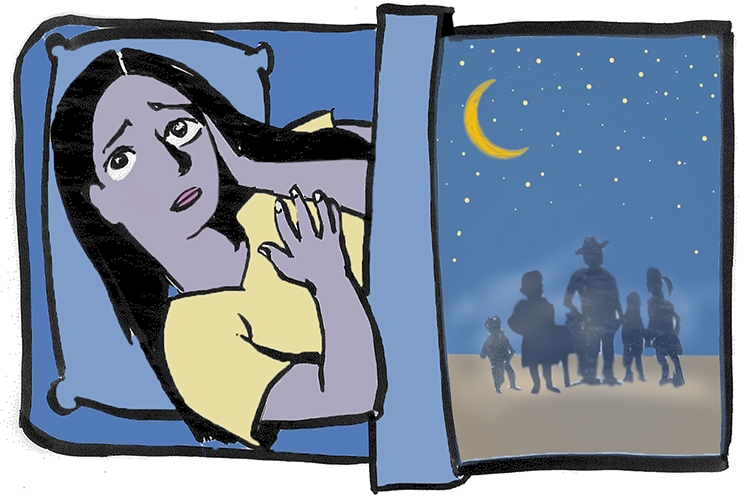Deportation worries fuel anxiety, poor sleep, among U.S.-born Latinx youth

The rise of anti-immigration rhetoric and policies in the United States following the 2016 presidential election may be taking its toll on the health of California’s Latinx youth, including those who are U.S. citizens, suggests a new study led by University of California, Berkeley, researchers.
The study tracked the mental and physical health of U.S.-born children of Mexican and Central American immigrants in California in the years before and after the 2016 election. It also asked about their sleep quality and their degree of worry about the personal consequences of U.S immigration policies.
Nearly half of the youth reported worrying at least sometimes about the impacts of U.S. immigration policy on their families. Those with more worries also experienced higher anxiety and poorer sleep quality than their peers.
When the researchers compared the youth’s well-being before and after the election, they found that anxiety symptoms increased more markedly among individuals who reported more worry about immigration policies.
“We’re seeing an increase in anxiety that is related to kids’ concern about the personal consequences of U.S. immigration policy, and these are U.S.-born citizens,” said Brenda Eskenazi, the Brian and Jennifer Maxwell Endowed Chair in Public Health in UC Berkeley’s School of Public Health.
“Further, these are kids in California, a sanctuary state with more protective policies for immigrant families, compared to many other states,” Eskenazi said. “So, this study is probably reflecting the best-case scenario of how children of immigrants in other states are being affected.”
Eskenazi is the lead and corresponding author of a paper describing the results that appears June 24 in the Journal of the American Medical Association: Pediatrics.
The research drew upon mental and physical health data of 397 Latinx youth that was gathered by the Center for the Health Assessment of Mothers and Children of Salinas (CHAMACOS), a longitudinal study of Mexican farmworker families in California. Each participant in the study had at least one parent who was an immigrant; the documentation status of the parents was unknown.
Researchers assessed teens’ blood pressure, body mass, anxiety and depression symptoms and overall health at the age of 14, before the 2016 presidential election, and again at the age of 16, during the year after the election.
At their evaluations at age 16, teens also completed the Pittsburgh Sleep Quality Index, which assessed their sleep quality, and the Perceived Immigration Policy Effects Scale (PIPES), which gauged their levels of concern about the effects of U.S. immigration policies on their families.
Between 41% and 45% of the teens reported on the PIPES survey that they worried at least sometimes “about the impact of immigration policies on the family,” “about family separation due to deportation” or “that a family member would be reported to immigration officials.” Teens with those concerns experienced higher anxiety levels and worse sleep than the others.
“These results are problematic, because high levels of anxiety are not necessarily fleeting,” said Nancy Gonzales, dean of natural sciences at Arizona State University and co-author on the paper. “They can impact other aspects of children’s well-being including their ability to stay focused in school, and if they are living with prolonged anxiety, that also has long-term effects on their physical health and susceptibility to problems like alcohol and substance abuse.”
Co-author Julianna Deardorff, an associate professor in the Maternal and Child Health Program in UC Berkeley’s School of Public Health, noted that the higher levels of anxiety faced by these teens is likely piled on top of other challenges and responsibilities that come with living with immigrant parents, including being an English translator for Spanish-speaking family members and helping relatives navigate U.S. services and institutions. The fear of having a family member reported may also keep them from seeking treatment, Deardorff added.
“It’s not just that these youth are faced with the prospect of ICE coming to their door and taking away their parents, but in addition to that, they are having to navigate through settings that may not feel friendly in this political climate, in order to help themselves and their parents,” Deardorff said.
The team is currently following up with the teens at age 18 to see if the increase in anxiety observed the year following the election has continued. It also is assessing the teens’ academic performance and whether they are engaging in high-risk behaviors.
Study co-authors also include Carolyn A. Fahey, Katherine Kogut, Robert Gunier and Nina Holland of UC Berkeley and Jacqueline Torres of the University of California, San Francisco.
This work was supported by the National Institute of Environmental Health Sciences, the National Institutes of Health (NIEHS, NIH) (R01 ES021369, R01 ES026994, P01 ES009605 and R01 ES017054), the National Institute on Drug Abuse (NIDA, NIH) (R01 DA035300) and the Environmental Protection Agency (EPA) (R82670901, RD83171001 and RD83451301).
RELATED INFORMATION
